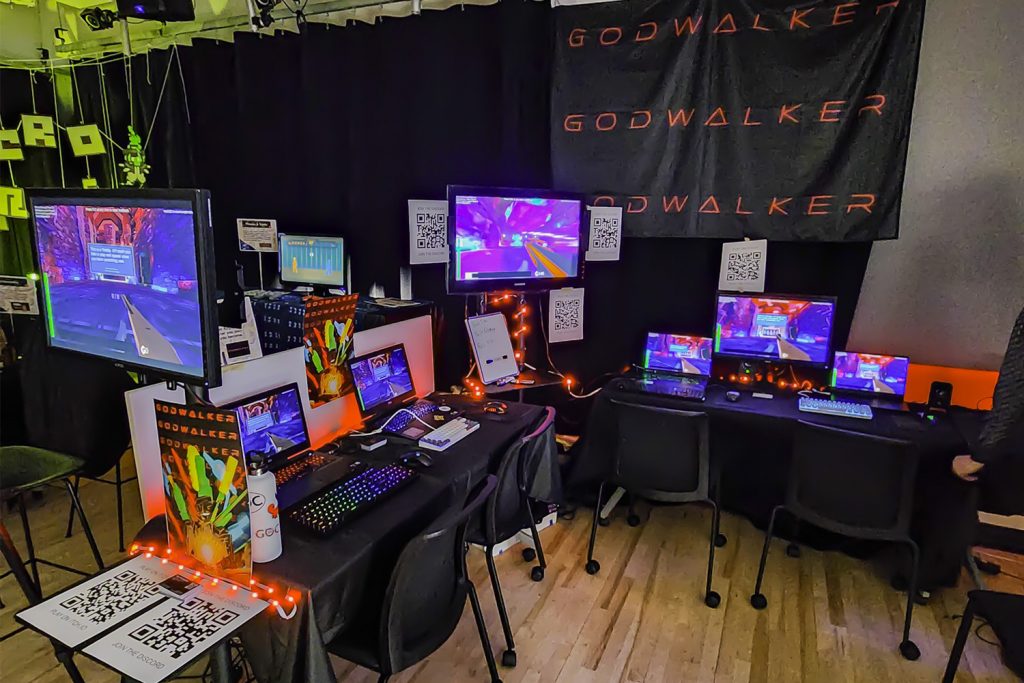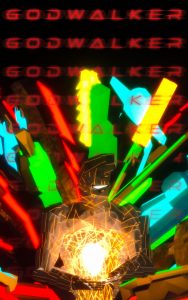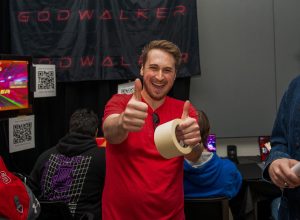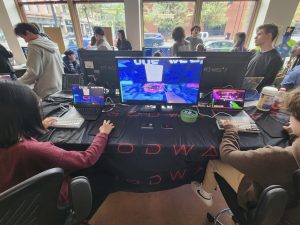July 6, 2023 | Kimberly Phillips
‘My whole life I secretly wanted to make video games but was scared. I didn’t think it was something that I was allowed to do because it seemed too fun’

Josh Hirshfield was that kid in middle school who’d spend all weekend playing video games.
“I was playing on my parents’ 1997 Dell computer with 128MB of RAM, because that’s what we had at the time. Playing old titles like SimCity 4 or Roller Coaster Tycoon exposed me to the idea of creating digital virtual worlds,” he says. “The one that really blew my mind was Spore by EA. It introduced me to this world of 3D design where you can make buildings and creatures, animals and spaceships all from your computer.”
When Hirshfield ’21 (SFA) went back as an adult to visit his seventh and eighth grade teachers and told them he now makes video games, no one was surprised.
“My whole life I secretly wanted to make video games but was scared. I didn’t think it was something that I was allowed to do because it seemed too fun,” he says.

Now, almost every day is fun for the Stamford native who just earned his MFA in game design from NYU, has his own independent studio, is working with the Neag School of Education to create educational software, and has interviewed for senior-level positions at some of the largest companies in the industry – at 24 years old.
“For a lot of my life, I thought I would do things around video games, like make the art or make the music for video games. It was only once I had a high school class in game development that I realized there was a path for building video games,” he says, explaining that class prompted him to consider colleges with game design programs, which led him to UConn’s Digital Media & Design.
“The idea that I could get a degree where one of the words in the degree is ‘games’ is really amazing and those programs are hard to find,” Hirshfield says. “UConn has one, it was accessible, and my parents loved it when I told them I wanted to make video games. Finding and pursuing a passion really matters to me and my family.”
As an undergrad, Hirshfield loaded his schedule – almost overloading it – with independent studies, one year even acing all his classes and adding 48 credits to his transcript. He says he would pair a class like Interactive Storytelling with an independent study to produce projects that paralleled the lessons learned in class.
Another independent study coupled him with the School of Business to create an interactive training program for the Connecticut Community for Addiction Recovery. That program, The Recovery Files, aims to train recovery coaches in what to say – or not say – by presenting them with interactive sample text messages for a variety of scenarios.
“Most video games are fun. Most are about bringing enrichment to your life. But some tell sad stories just like film or TV,” he says. “And serious games are this idea that by sharing an experience you can perform social action. The idea of The Recovery Files was that you would play it and the serious function of the game was to train and enrich the minds of those who are going to help others.”
Hirshfield says he cares deeply about this genre of gaming and wants the opportunity to make a difference, like with Courtroom 600 – a production from Greenhouse Studios and other UConn departments to document the Nuremberg Trials – which Hirshfield worked on one semester while an undergrad.
Then there are other times when gaming just needs to be about gaming – an escape from reality.

“I get made fun of a lot because I care about social action games and then I go and make the most stereotypical video game ever,” he says of the first-person shooter game Godwalker, in which the idea is to shoot the bad guys as quickly as possible to gain strength.
“It’s not very long, it’s not very big, but I did make it on my own,” he explains. “I didn’t buy any assets. I didn’t have anyone make anything else. It all came from my computer and my brain, and to me that’s an invaluable piece of work to have. You can present it to someone and say, ‘This is something that I made, and I think it’s really cool.’”
He told people a variation of that in April when he trekked to Troy, New York, to demo Godwalker at Rensselaer Polytechnic Institute’s annual GameFest, an event that draws game designers from throughout the Northeast to compete for a series of awards – real-life awards, not ones handed out in a game world after virtual play.
“The first game I ever made, Aether, went to RPI GameFest because I just wanted to show it to people and see how they liked it. The judges ended up giving it the award for Best in Game Feel, which is really cool,” he says of the game that was developed mostly during high school and finished at UConn.

Aether received acclaim in 2018. This year, Godwalker earned the award for Excellence in Design, while Lexy Vecchio ’23 MFA received the Impact Award for Here There Be Bears.
“The judges are from throughout the industry, and you get some awesome validation from external sources that aren’t just your friends,” Hirshfield says. “I hate having an ego, but it’s cool that I can say I’m pretty good at the thing I do.”
While he now mulls the question of what comes next, Hirshfield notes that a friend is the person at the New York Times who makes sure games like Wordle and Spelling Bee come out on time every day.
“What does a game designer actually do,” he asks. “Do you think that the New York Times crossword puzzle just pops into existence? We work in the background. A good design is not something you notice.”
UConn Today Article: https://today.uconn.edu/2023/07/childhood-dream-becomes-reality-for-video-gamer-turned-designer/